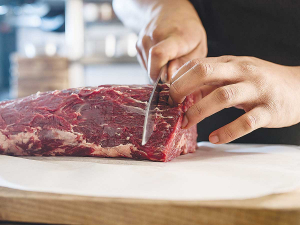Red meat rebound
The red meat sector is poised for a strong rebound this season, with export receipts forecast to top $10 billion and farm profitability to almost double.
 A new website has been launched which brings together independently-verified facts and insights about NZ beef and lamb from a health, nutrition and environmental perspective.
A new website has been launched which brings together independently-verified facts and insights about NZ beef and lamb from a health, nutrition and environmental perspective.
In an effort to counter misinformation about, and to promote the benefits of, NZ red meat, a new website was launched last week.
The www.makingmeatbetter.nz website, developed by Beef + Lamb New Zealand (BLNZ) and the Meat Industry Association, brings together independently-verified facts and insights about beef and lamb from a health, nutrition and environmental perspective.
BLNZ chief executive Sam McIvor says the motivation behind the website is to make it easier for New Zealanders to find the facts about the production and consumption of beef and lamb.
“New Zealand’s farming methods are different and more sustainable,” he says.
“However, a lot of what people hear about red meat production is based on international research and overseas farming systems.”
McIvor says it’s important that New Zealanders have access to the facts about how meat is produced in this country and what that means for their health and the environment. He adds that NZ’s farming is a model for how to produce healthy red meat in a sustainable way.
“The way we farm is better for animals, better for you, better for the planet and better for communities.”
McIvor says the website allows sheep and beef farmers to share the concerns of many of their customers about issues such as climate change, biodiversity loss and water quality.
“NZ red meat production already has some great environmental stories to tell. Our sheep and beef sector has a goal of net carbon neutrality by 2050 and is already a long way towards achieving this.”
He points out that greenhouse gas emissions from NZ sheep and beef farming have decreased by 30% since 1990, while production levels have remained stable – and during the same time, the sector has more than doubled its export receipts.
“The carbon footprint of sheep and beef production is around half the average figure globally.”
The website also includes facts about the health benefits of NZ red meat. Fiona Windle, a registered nutritionist at BLNZ, said consumers are also looking for reliable sources of information about diet and health.
“Like everyone, we hear a lot of polarising and confusing views out there about what’s good for us. The reality is grass-fed red meat, like we produce in New Zealand, plays an important part in a healthy and balanced diet.”
Sirma Karapeeva, chief executive of the Meat Industry Association, says NZ’s red meat sector supports wider rural communities including schools, local businesses and community facilities.
She says the sector accounts for nearly 5% of total employment in New Zealand – more than 92,000 people, on-farm and in processing and support services
“The NZ meat sector contributes income of $3,300 per year to every household in NZ and generates $12 billion in income per year for the country.”
Legal controls on the movement of fruits and vegetables are now in place in Auckland’s Mt Roskill suburb, says Biosecurity New Zealand Commissioner North Mike Inglis.
Arable growers worried that some weeds in their crops may have developed herbicide resistance can now get the suspected plants tested for free.
Fruit growers and exporters are worried following the discovery of a male Queensland fruit fly in Auckland this week.
Dairy prices have jumped in the overnight Global Dairy Trade (GDT) auction, breaking a five-month negative streak.
Alliance Group chief executive Willie Wiese is leaving the company after three years in the role.
A booklet produced in 2025 by the Rotoiti 15 trust, Department of Conservation and Scion – now part of the Bioeconomy Science Institute – aims to help people identify insect pests and diseases.